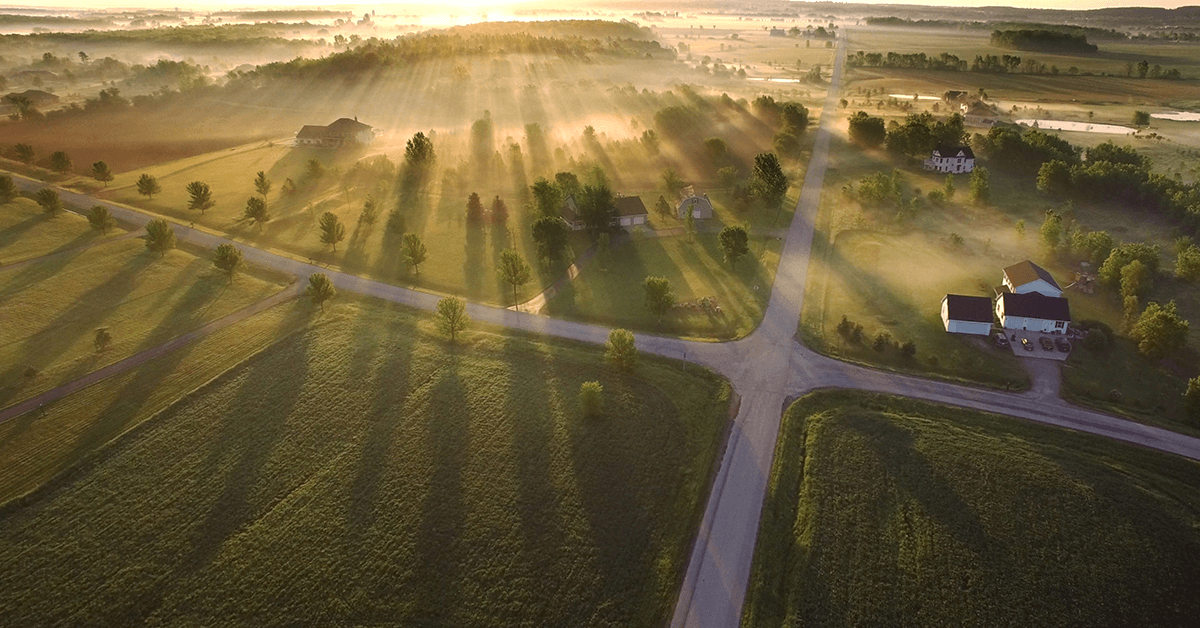
COVID-19 Drives Interest in Rural Homeownership
How we live in, and the way we use, our homes are constantly changing due to COVID-19. Early on, the pandemic and the rise in remote work shifted home buying preferences toward homes with dedicated office space and spacious yards. Now, nearly six months after most states went on some form of lockdown, the pandemic is still shaping our home search preferences.
Data from Realtor.com, comparing trends from June of 2020 to June of 2019, shows homes in rural and suburban zip codes are experiencing a surge of interest. Homes in suburban zip codes saw a 30 percent increase in views and homes in rural zip codes saw a 34 percent increase in views.
Homebuyers are looking at rural and suburban areas, as their need to be located in an urban center dwindles due to the rise in remote work and their desire for more space increases. Historically low-interest rates are helping hesitant potential homebuyers looking for more space to make the leap into the housing market. A Redfin study noted, “The typical home that went under contract during July in a rural or suburban area was over 1,800 square feet, compared to the typical urban home that went under contract during this time of about 1,500 square feet.”
Despite the increased interest in rural homeownership, home sales in rural areas remain flat from last year (-0.9%) at the end of July. However, when compared to home sales during the same period in suburban areas which saw a 4.7 percent dip in sales, and urban areas which saw an 8.9 percent decline, it’s obvious the interest in rural homeownership is real.
Realtor.com data shows that across urbanicity, the pace of the market – as measured by days on the market – has slowed nationally. “However,” the report notes, “May data shows that rural and suburban zip codes have been more resilient to this slowdown compared to urban areas.”
“We’ve been speculating about the increasing interest in the suburbs and rural areas since the start of the pandemic,” Taylor Marr, an economist for Redfin said. “Now we’re seeing concrete evidence that rural and suburban neighborhoods are more attractive to homebuyers than the city, partly because working from home means commute times are no longer a major factor for some people.”
While it’s impossible to predict the future, especially during a pandemic, there is speculation the rural homebuying trend may not be reflective of homebuyers’ long-term buying patterns. When the country begins to return to pre-pandemic business as usual and some remote work options are eliminated, long commutes from rural areas may begin to wear on these former suburban or urban homeowners.
Darlene Schror, a northern New Jersey-based REALTOR® noted, “Post-pandemic, buyers may realize that while their new neighborhoods make for a nice weekend getaway, the long commute may become unsustainable should things go back to normal. And they’ll miss city amenities like high-quality restaurants, shopping centers, and walkability.”
Additionally, low housing supply in rural areas may inflate home prices making lenders nervous about the stability of the rural market over time. Home supply in rural areas was down 37.9 percent year over year and new listings in rural areas fell 14.2 percent year over year.
“Lenders should be nervous that rural markets are affected by situational price increases,” Schror noted. “Rural home values are going up now because of the pandemic, but if people lose their jobs or decide they’d rather live closer to the city, these buyers may be sitting in homes for which they’ve overpaid at a time when they need to re-sell.”
As with any move, potential homebuyers should carefully consider their motivations. Acting rashly due to low-interest rates or quarantine induced cabin fever may leave you with buyer’s remorse. A REALTOR® who understands the rural housing market you’re considering can help you get a sense of the community, discuss potential pitfalls, and make informed predictions about the long term stability of that particular market so, if you do buy in a rural area, you’re happy with your purchase for years to come.
There’s no denying that COVID-19 related lockdowns have awoken the dormant homesteader in many homeowners who are following their dream of a simpler life into rural America.
Time to Focus on Affordable Housing
Taxes on real estate are not the answer. Sign the petition calling on Congress to address our country’s housing shortage.





